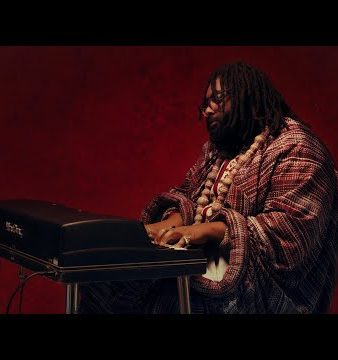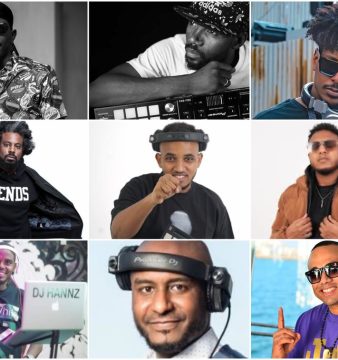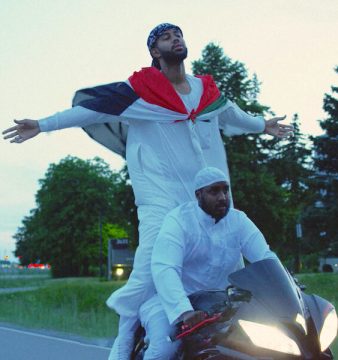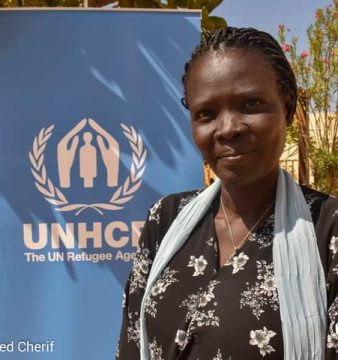Blak-Ram: The Sudanese-British Rapper Committed to Making A Change in Sudan
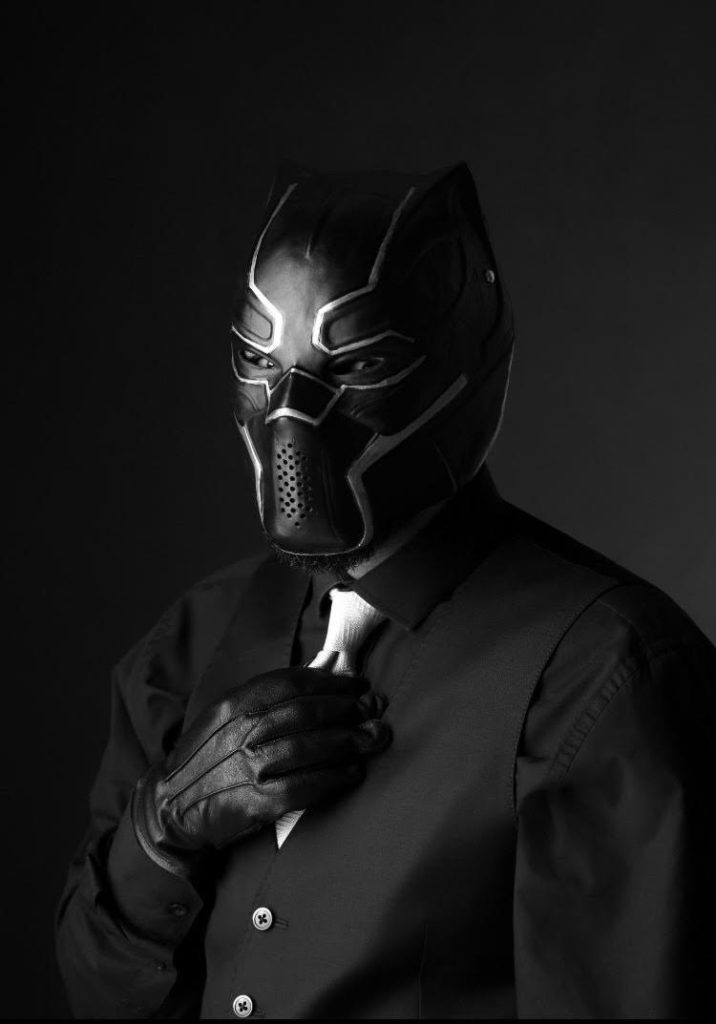
It would be an understatement to say that the Sudanese revolution of 2018 has invoked a fire within many Sudanese at home or in the diaspora.
However, Sudanese creatives have truly emerged from all corners of the world as a result of the revolution and are definitely set on making their voices heard.
From music artists to poets to filmmakers and more, many have dedicated their art to the Sudanese revolution, its victory and most importantly, its martyrs. And Sudanese-British rapper Blak-Ram is no exception.
Blak-Ram is not a newcomer to the rap game. Since his debut in 2012, he has consistently been delivering tracks that relate to the Sudanese struggle, having been directly affected by the atrocities of the blood-thirsty regime. His father, Akram Al Fatih Youssef, was one of the 28 officers who were executed by the National Congress Party (NCP) regime on the 28th Ramadan in 1990 after a failed coup. The 29-year-old rapper Akram – named after his father – has made a commitment to shine a light on the Sudanese plight through his music.
In this interview, 500 Words Magazine finds out more about the man behind the mask, his goals and aspirations, and finally, his upcoming extended play record (EP), “#MakeSudanGreatAgain”, where all proceeds from the EP will be dedicated to rebuilding a better and brighter Sudan.
Who is the man behind the mask, Blak-Ram?
In many ways, Akram is like Bruce Wayne and Blak-Ram is the vigilante alter ego. I see a lot of parallels between myself and many superheroes who lost a parent. I was born in Wad Medani with no siblings. It was just me and my mom. We moved to the UK when I was a year old as she was grieving and fed up with living in a dictatorship and wanted a better life for me. She never remarried. We never really settled in one place. We moved to the Gulf and then back to the UK for university. With no brothers and sisters close by, I’d have to fight a lot of my own battles. I’m a family-orientated person. I try to do what I can for the community, which is why my EP is for charity.
When and how did you know you wanted to become a rapper?
Strangely enough it was never an aspiration as a kid. I have always been creative. I had ambitions to be comic book artist and animator, but as I grew older, my drawing skills regressed since I didn’t practice enough. I used to dabble in rap naturally as I heard more of my favourite rappers. It just suddenly developed. My incentive was to tell my story because this is what hip-hop is about, telling your unique perspective in music form, but I still hadn’t developed my storytelling abilities in rap so I had to re-evaluate myself a few times after getting some constructive feedback from more established artists. From 2010 onwards, I took it a little bit more seriously and producers would send me beats. I first performed on a mic in 2011 and first went to a studio in 2012 when I dropped my first mixtape on old instrumentals. It was a little raw not as polished as now. I had a lot of cool concepts but a few struggle bars here and there, and some rushed flows. The barrier to entry for me had always been cost and Sudanese parents are not generally supportive of these endeavours so they won’t invest in it even if it is for a good cause. I never really had a team around me or friends who wanted to do the same I kind of had to network and find out things myself.
‘My incentive was to tell my story because this is what hip-hop is about, telling your unique perspective in music form’
There have been countless rappers throughout the years who have decided to mask their identity, such as the legendary MFDoom. What was your reasoning behind hiding your identity?
For a myriad of reasons; I used to rap without a mask but I couldn’t gain much traction. I felt like my visuals were not eye-catching enough so I rebranded myself. I got this particular mask before the hype surrounding Black Panther and decided to incorporate it into my persona as a symbol of pan-Africanism. I also think using masks for different videos gives different aesthetic effects and it also makes it easier to make videos as lip syncing is not an issue.
People who know me know me so I’m not completely mysterious. I’ve been on BBC Arabic before talking about getting justice. I’m just not big on getting on camera without the mask when I’m Blak-Ram. I try to keep my social media accounts just about my creative works rather than my lifestyle, but in this day and age, unfortunately, you have to sell yourself as well as your music. I’m quite introverted and have become more of a recluse as years have gone on and I want to be known for what I can create that is unique to me and not be known just for how I have suffered so people can’t just make the connection by looking at my face, but by digging into my catalogue.
‘It’s an identity paradox they know me but don’t know what I’m capable of. This has been the underlying theme – being ignored but garnering notoriety nevertheless.’
My likeness is often shared without my consent amongst this community and I am used and pitied. A lot of people in the Sudanese community know me as Wad Al Shaheed but they don’t know me. A video of me being told the story of the execution went viral, but when I make a comment on social media saying it’s me can you share my music it often gets ignored probably due to the language barrier. It’s an identity paradox. They know me but don’t know what I’m capable of. This has been the underlying theme – being ignored but garnering notoriety nevertheless. I don’t seem to know how to break into the Sudanese algorithm so I cannot break through like others who have gone viral. I’m not even looking for global celebrity status. I just want respect amongst my peers and the ability to do something for my people.
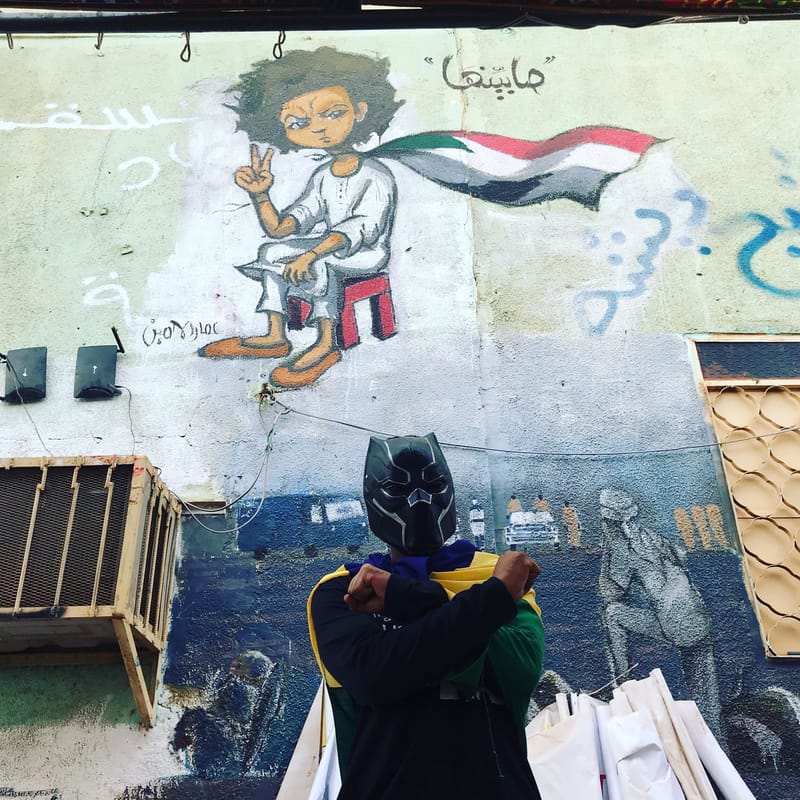
With so many rappers opting to rap about their belongings and lavish lifestyles, why did you feel it was necessary for you to rap about Sudan and its revolution? In other words, why did you decide to get ‘political’?
It is a duty as who I am and who I was born to makes it mandatory. It’s my destiny. I feel like rap is the only way I can get my voice heard but even that has been a struggle. The chanting during the protests whilst effective is a collective of voices and your own gets lost in the scrimmage, whereas rap is a medium that allows me to express my feelings tell my story and discuss multiple topics in a rhythmic form as someone who is not a native Arabic speaker, it is difficult to lead chants.
‘I feel like rap is the only way I can get my voice heard’
With respect to being political, I’m not affiliated with any particular political party. I just want justice/revenge, or however you want to put it, for my father and everyone who has been a victim of the regime. I want human rights for all except the criminals, who lost their rights by committing the atrocities. Now, I have songs about various topics, but my sole purpose in becoming a rapper was to tell my unique story to try and invoke change. When I was younger, I used to dream of going to the presidential palace and doing something crazy, but as I got older, I realised that isn’t the way to get revenge. It requires the togetherness and coordination that the people of Sudan have demonstrated.
Tell us more about your song writing process.
I actually have a variety of different ways I approach a song. In my earlier days, a clever punchline would hit me out of the blue and that punchline would snowball off into a bigger song by putting layers upon layers. Now, I sit down and listen to a beat for some time ask what it’s asking of me and what kind of vibe it’s giving off and then try and paint that picture with words. Now, with my songs about the revolution, my approach was a little different. My objective is to create a narrative and try to include as many aspects as possible showing the trials and tribulations of the revolution.
Who are some of your musical inspirations?
Ras Kass, Kool G Rap, Royce Da 5’9, AZ, Nas, Rakim, Wu-tang, MCs who have a heavy emphasis on bars and storytelling. Even though I’m a UK based rapper I don’t have many influences from my country of residence. I grew up listening to mostly US hiphop the variety of sample heavy melodic beats from legends like DJ Premier and Pete Rock appealed to me more than the local grime scene or the current wave. UK hiphop is very much an underground genre as Grime, Drill and Afrobeats have taken over. It’s not to say I only do boom bap. I’ve proved I can do something different with Janjaweed Deeds, provided that I like the beat. I also love orchestral music in games and movies, and hope to one day get the services of a hip-hop orchestra at one of my live shows.
On your track, “Orchestrating an Uprising”, you have mentioned your father, Akram Al Fatih Youssef was one of the 28 officers executed by the NCP in Ramadan 1990. As someone who has been directly affected by the atrocities of the NCP, how did you feel witnessing the downfall of the regime?
I had been trying to make this song for years but I didn’t have the knowledge or skills earlier on to pull it off so I put it in the vault. I actually wanted to start a revolution with the song but with my lack of Arabic and limited influence, it wouldn’t have ignited protests like I would have liked to imagine. I was named after my father so yes his name is Akram. I’ve actually just passed him in age this year as he was killed at a young age. It has been very difficult. There has been a huge void in my life never meeting my father, not knowing the burial site, not even hearing his voice and the nature of the execution was very brutal from the new testimonies I’ve heard this year.
Honestly, it has been a mixed bag of emotions. Everybody is telling me to be ecstatic, “You got what you want!” then the 29th of Ramadan (3 June) happened, an even more brutal repeat of almost 30 years ago but this time against civilians. At the same time, as someone who lost so much and still broken inside almost 30 years on, I feel like I should have been more involved by being in Sudan earlier and marching towards the Military HQ ousting former Sudanese President Omar Al Bashir and the NCP almost personally, like the rest of the protesters. That isn’t to say the diaspora has not been crucial but for me. Language barrier has been a huge problem so unlike those abroad who were able to coordinate events and movements. It has been difficult for me, because I struggle to read and write Arabic and most of this coordination is online using messages. So I wanted to be there in person, however my passport had expired. I tried to renew my passport once I heard rumblings of a revolution but by the time it had arrived I had already started my songs, “Orchestrating an Uprising” and “The Warrior’s Journey”, so I decided to finish them before I left and missed the fall of Al Bashir in Sudan. It was a difficult decision.
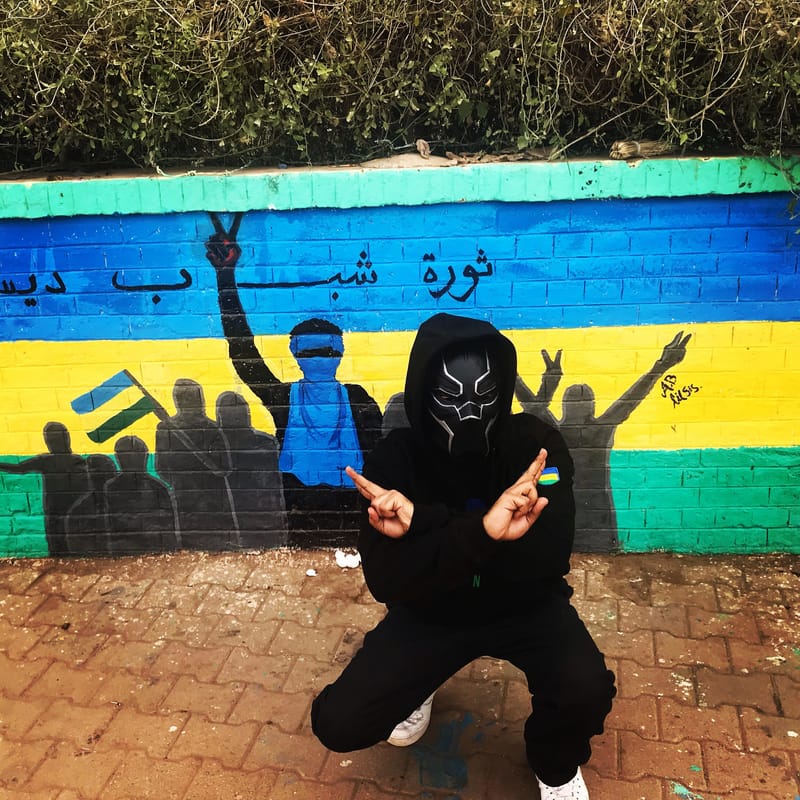
How do you plan on making sure that your father’s legacy lives on through your music?
It’s a legacy that is impossible to live up to. He was a hero, who rescued many lives. For those who haven’t seen it (spoiler alert) the ending of avengers endgame pretty much mirrored my father’s brave sacrifice. I can mention anecdotal accounts of his achievements, but it really cannot scratch the surface of who he is. I still don’t really know who he was, as you really needed to be around him even some video footage would have sufficed to give me a better understanding of the man who gave me life.
There are many Sudanese rappers on the scene at the moment. What sets you apart from the rest?
Aside from the mask which is more of an aesthetic attribute. There is a lot that sets me apart from all rappers not just Sudanese ones. My subject matter is diverse I can talk about anything and sometimes rap about obscure things driven by concepts and will go out of my way to create something unique.
My raps are also heavily influenced by gaming. In fact, I have songs about games and using instrumentals from obscure franchises like Bayonetta and my songs contain many subtle references to games. How many people can say they talked about the poverty and hyperinflation in their country over a Super Mario hip-hop beat, ”Rise in the Struggle”.
My wordplay is very unique too and multi-layered and sometimes needs to be deciphered for a casual listener. Take these bars:
‘In the ICU, your life is through
On his ECG he be green
deceased in the IV
and on the ventilator C4
Is rigged to end a traitor he saw
the numeral clock only to
wonder when this tumour’ll pop
Facing cardiac arrest
in numerous stops
Flatline and humour your drop’
On the surface it seems routine or you’re thinking what the hell is he talking about and because I alternate between second and third person when referring to Al Bashir. I am stating that his time is up. I play with the word and abbreviation “IV” the number 4 in Roman numerals, ivy (intra venous drip) to suggest that that the poison inside ivy spewed from Al Bashir is sickly dying and withering himself people who are sick and diseased tend to be green like ivy. I also referred to him as a frog in the first few bars of the verse and green just like the heart rate monitor checking his pulse (the ECG) with peaks and troughs shaped as V and I but also soon to be deceased as C4 the bomb is about to detonate in four days months or an unknown time limit. (So I advise him to watch the clock) using the abbreviations ICC I CU ECG and IV to create a certain effect. And the month that he was ousted was on the fourth month on the calendar. Now, that there was just coincidence. It comes across very convoluted, I know.
And technically I do a lot of things differently. I have a high rhyme density using internal rhymes – rhyming whole bars through assonance rather than words at the end of the bars, so that there is a tongue twisting effect that makes rehearsing for live shows tricky. I don’t use your typical rhyme scheme. For example, if a certain word doesn’t rhyme, I find a way to make it rhyme through slant rhyming with certain enunciations or creating multi-syllabic rhyme phrases mid-sentence to tell a story.
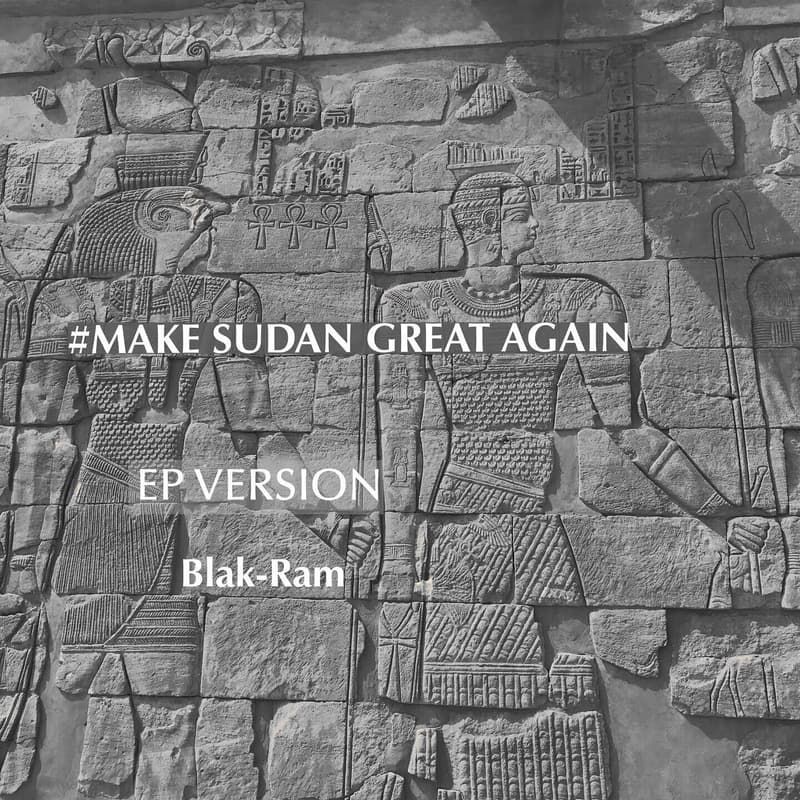
Tell us more about your upcoming EP, “#MakeSudanGreatAgain”?
I would say it is my debut retail project. I have released two mixtapes before but they were mostly stepping stones to hone my craft. This EP is very polished I didn’t cut any corners like I had done with the free mixtapes that included a lot of experimentation. So with this EP I would return to the studio to tweak small things and make it the best it can be.
‘The name says Sudan used to be a great nation and civilisation, and we have the power to return it to being the pillar of civilisation’
The EP is clean. There are no curse words as you can see there is no Parental Advisory warning on the cover. I did this in order to gain a larger audience as our elders are sensitive to profane language. I picked the name “#MakeSudanGreatAgain” because the funds received from sales are literally used to make Sudan a better place, however small the contribution. It is an ironic name spun off of the controversial Trump slogan, “Make America Great Again”. I wanted to turn it into something positive much like how the N-word was re-written and converted by African Americans into a term of endearment amongst one another. The name says Sudan used to be a great nation and civilisation, and we have the power to return it to being the pillar of civilisation. I used the Kushtic hieroglyphics that I took on a trip to Meroe as artwork to convey that message and it is the black and white EP version because it is under nine tracks long. The full LP will be in full colour not monochrome.
This EP builds up a narrative of the revolution from the beginning starting with: poverty and the economic crisis, the war crimes (with my personal pain included) committed, the protesting, the crackdown of 3 June, the negotiations for a civilian government sending militias to Yemen, and getting involved in illegal international wars to where we are now.
Do you have a personal favourite from the project?
Well I love the beat for “The Warrior’s Journey” and the song it really comes from the heart as you can vicariously feel my pain. “Janjaweed Deeds” is something that I am proud of stylistically and I know it was a hit with a lot of fans. I do wish that I was able to release it earlier during the internet blackout to generate more awareness, but there were studio issues.
What do you hope your listeners take away from your music?
I hope they will continue the fight because the work is not done yet. There are a lot of war criminals still running loose and injustice is rampant. I hope they keep that same energy they had and hear another perspective of the revolution from someone who suffered a lot but also covers multiple aspects of the revolution.
Any last words for our readers?
Buy the EP from my website. It is available now! http://blackbatteringram.wixsite.com/blak-ram.
Every sale goes towards a non-profit organisation working in Sudan to contribute to medical care and rebuilding homes from the recent floods. There is a lot more to come from me including videos for “Janjaweed Deeds” and “Orchestrating an Uprising”.
Interested in following Blak-Ram, visit his website blackbatteringram.wixsite.com, or find him on social media: YouTube, SoundCloud, Instagram @blak__ram, Twitter @Blak_Ram.
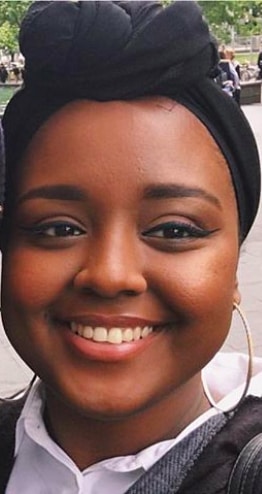
Ola Khalil is a 24-year-old public relations professional currently based between Abu Dhabi, UAE and Australia. When she’s not working on a PR campaign, Ola enjoys writing, meeting new people and listening to old school hip-hop which she considers her first love. She is proudly Sudanese and hopes to one day go back to the motherland to make a change.

